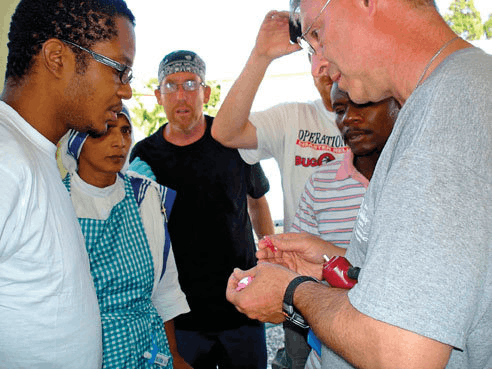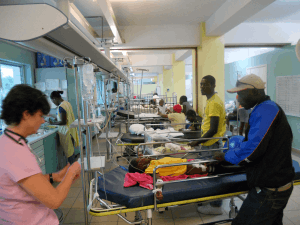Office of Pediatric Global Health
Global Health Program
Akron Children’s established its Office of Pediatric Global Health to partner with St. Damien’s Pediatric Hospital in advancing the care of Haitian children while providing educational opportunities for Haitian and U.S. residents.
Our Office of Pediatric Global Health formed the St. Damien’s Collaborative in 2001 to partner with children’s hospitals across North America. This group teaches men to fish by:
- Providing bi-directional U.S. & Haitian resident education.
- Providing in-country clinical services and education for physicians, nurses and allied health personnel.
- Developing clinical pathways to improve care and efficiency in the emergency room and intensive care unit at St. Damien’s.
- Fund training for the first Haitian pediatric cardiologist, expected to graduate in 2017.
- Facilitate equipment donation and training including: a CT scanner, ventilators, surgical equipment and ICU monitors.

Haiti
One of the poorest countries in the world, Haiti faces many problems, ranging from political unrest to natural disasters. Most citizens are unemployed and survive on less than two dollars per day. 138,000 children die of preventable diseases each year. Major medical problems include infectious diseases like tuberculosis, HIV/AIDS, cholera, and malaria, and chronic conditions like sickle cell disease, congenital heart defects and cancer. In addition, most patients are also malnourished—sometimes severely. Finally, there is a general lack of health care infrastructure to treat the vast range of medical issues: even vaccines need broader implementation.
Akron Children’s involvement in Haiti began after the devastating earthquake struck the country in January 2010. By June of 2010, Akron Children’s signed an affiliation agreement between our hospital and St. Damien’s Hospital, which is located in the capital city of Port-au-Prince and is the only pediatric hospital in Haiti.
Notable projects have included improvements to critical care, sickle cell disease and cardiology. All efforts are tied to the ultimate goal of educating Haitian health care providers to have the capacity to meet their population’s needs. We work collaboratively with our St. Damien’s colleagues to support their ideas and projects to improve health care for Haitian children.
Emergency Medicine and Critical Care
Immediately following the earthquake, St. Damien’s Hospital was flooded with patients experiencing burns, broken bones and other crush injuries on top of the infectious diseases and malnutrition complications faced regularly by Haitians. Akron Children’s worked diligently to provide support, as well as develop standard protocols for addressing pediatric resuscitation and pediatric advanced life support. By the fall of 2010, however, Haiti was in the midst of a cholera epidemic, which led Akron Children’s to bring intraosseous needles to train St. Damien’s staff to facilitate infusion through bone marrow. Akron Children’s has assisted St. Damien’s in bolstering the intensive care unit to better manage critical care of emergency patients, as well as those recovering from surgery.
Sickle Cell Disease
Despite being a prevalent disease in the country, Haitian children afflicted by sickle cell disease are less likely to survive childhood and experience a poorer quality of life than those in developed nations because of lack of access to the latest treatments. Sickle cell disease is an inherited blood disorder where red blood cells deform into a crescent shape. The crescent-shaped cells die early, leaving a shortage of healthy red blood cells and inhibiting blood flow, which causes pain and can inhibit oxygen from reaching vital organs. Akron Children’s is currently piloting the use of a drug known as hydroxyurea, which works in the blood to ultimately reduce the number of cells that distort into the sickle shape. It is easy to administer, as it can be taken as a pill or liquid, and is inexpensive, costing less than $1 per day. While used widely in the United States, Akron Children’s and St. Damien’s are working to ensure its efficacy and acceptance in Haiti, where factors including distance, travel and poverty can preclude families from accessing health care.
Cardiology
In the entire country of Haiti, there are no pediatric cardiologists. As a result, much of Akron Children’s engagement with St. Damien’s to treat heart-related issues has revolved around gaining necessary medical equipment and supplies, training practitioners in cardiac follow-up care and advanced life support, and improving general surgery practices. After developing a cardiac screening program, a list of patients requiring surgery was created. Since 2012, Akron Children’s has partnered with Gift of Life International to transport numerous children with severe congenital heart defects to our Akron campus for surgery. Although their parents are unable to accompany them to America, they trust our doctors to save their child. After partnering with Rotary International in 2015, Akron Children’s helped St. Damien’s begin conducting some open-heart surgeries in Haiti.
Training Healthcare Providers
Training Haitian medical staff has always been a high priority of the affiliation relationship Akron Children’s established with St. Damien’s, recognizing that giving health care providers the equipment, supplies, education and training needed to treat their patients is the most sustainable solution. In addition to our work with Rotary International Vocational Training Program, Akron Children’s has been an integral part of instituting a pediatric residency program at St. Damien’s. Multidisciplinary teams have also visited Haiti to hone skills and hospital processes through simulation. Training Haiti’s first pediatric cardiologist has also been a high priority.












